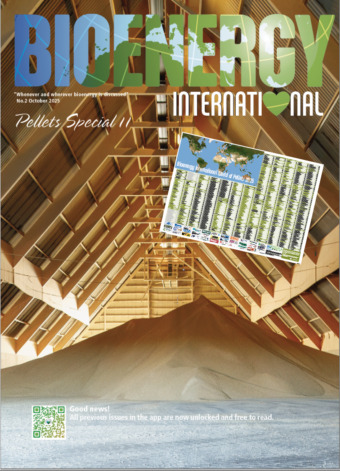Bord na Móna, the Irish semi-state peat resources company launched its Annual Report for the year ended March 28, 2018 (FY18) reporting a continued decline in the carbon intensity of its power generation, reduction of peat production and a proposal to develop new renewable natural gas (RNG) plant at Portlaoise, Co Laois.

Commenting on the results, Bord na Móna Chairman, Geoff Meagher said that the results point to the fundamental change underway in Bord na Móna as it implements its Decarbonisation Agenda, prepares for the imminent end of the Public Service Obligation, relating to peat for power generation, in 2019 and the exit from peat extraction for energy production by 2030.
As we make this transition we are acutely conscious that Bord na Móna contributes significantly to regional economic development and provides sustainable, quality employment in the Midlands of Ireland. The transition is extremely important as it will involve Bord na Móna further developing Ireland’s renewable energy infrastructure whilst remaining a profitable company. It will also involve our traditional businesses underpinning the development of our renewable power generation and resource recovery businesses. The success of this positive transition will be shared not just by Bord na Móna and its employees but by communities across the Midlands and the people of Ireland generally, said Geoff Meagher.
Carbon intensity reduction
Also speaking at the launch of the annual report, Tom Donnellan, Chief Executive of Bord na Móna noted that the carbon intensity of the electricity generated by the company has fallen for the eleventh year in a row, representing a 40 percent decline since 2007.
Furthermore, this “already steep” decline is set to continue as the company expands its renewable generation capacity with solar coming online and increasing wind and biomass.
This will see the carbon intensity of Bord na Móna electricity fall by 65 percent in 2020 and by 85 percent in 2025. The company’s move away from peat was also evidenced in the fact that during the year we reduced the operational area of our bogs to a point where we now harvest peat on just one percent of Irish peatlands. As someone who recently joined the company, I am pleased to say that the underlying performance of the company is sound and that the transition to a more diverse, sustainable business model is proceeding apace. This is reflected in the fact that the operating profit, before exceptional items, remains strong at EUR 33.2 million. The financial strength of the business is also reflected in the fact that the company is reporting a much reduced net debt of EUR 76.1 million, an impressive decrease from EUR 170.5 million in the previous year, said Tom Donnellan.
The company’s journey to a new, more sustainable business model saw it achieve some significant transition landmarks that also support the country’s decarbonisation agenda as detailed in the Irish government’s recently launched Climate Action Plan.
One significant landmark involved financial close being reached on the EUR 180 million Oweninny wind farm, a joint venture with ESB which serves as an example. This project demonstrates how we in Bord na Móna can best use our land bank of over 200 000 acres in order to support national policy to decarbonise, by investing in new forms of renewable energy that are secure and sustainable. During FY18, as part of our decarbonisation agenda, the group also restructured the Fuels business, closed the Littleton Briquette Factory and outlined plans to exit the coal business, Donnellan said.
New RNG project plans revealed
Progress on the sustainability agenda included the investment of EUR 31.3 million in a variety of projects. This expenditure involved a number of different business areas including;
- Resource Recovery where this expenditure was focused on transfer centres, waste to energy infrastructure, the purchase of new refuse collection vehicles and construction of engineered landfill cells for the company’s waste treatment facility.
- Also in Powergen, for an investment of EUR 5.2 million in Oweninny wind farm.
Other future-facing investment included a spend of EUR 9.3million on research and development including business development (exclusive of grants). This spend involves the development of new opportunities in areas such as renewable natural gas (RNG), waste-to-energy, wind and solar farms, new products and markets in the horticultural sector and process improvements in all areas.
In the former, the company announced plans to develop a renewable natural gas (RNG) project near Portlaoise in Co Laois. The proposed development could treat up to 80 000 tonnes of non-hazardous, biodegradable, organic materials per annum. This could include a combination of commercial food waste, brown bin waste, animal slurries, and purpose-grown crops, amongst others.
Anaerobic digestion (AD) process would be used to convert the organic materials into biogas which would be upgraded into biomethane for injection into the national gas grid, for supply through the existing gas network, to homes and commercial businesses.
The proposed project will bring significant environmental benefits through the sustainable treatment and conversion of non-hazardous, biodegradable, organic waste materials into renewable biomethane gas. The process will also produce a nutrient-rich by-product (bio-fertiliser) which will be suitable for land spreading on agricultural land and will be a sustainable alternative to traditional artificial fertilisers.


